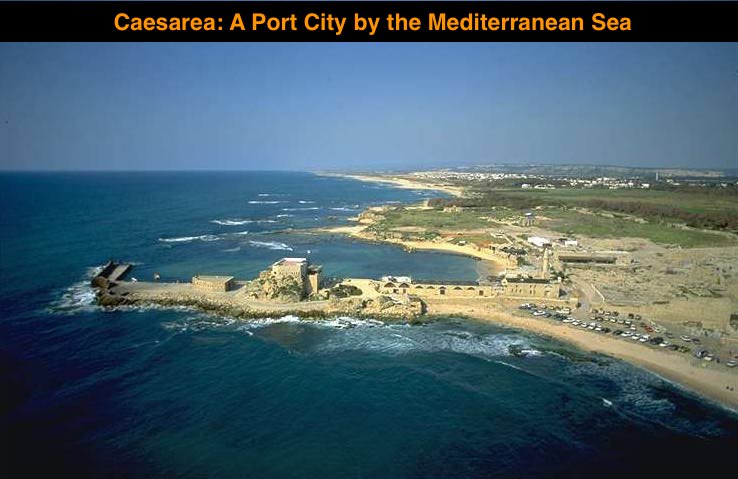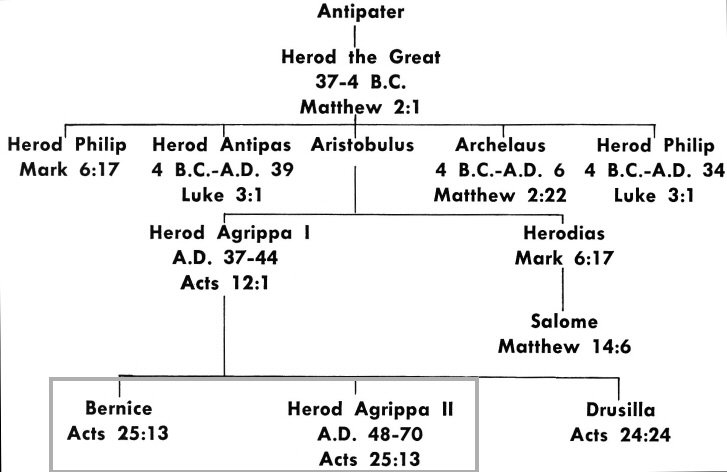Blog Post
Posted by Dion Todd February 10th, 2019 4,320 Views 0 Comments
Bible Study, Acts Chapter 26 from Refreshing Hope Ministries on Vimeo.
Today we are going to study Acts chapter 26 in depth. You can follow along in your own Bible if you like. I will be reading from the World English Bible because it is the only modern English translation that is copyright free, and I can read the entire Bible on video without any legal drama or breaking anyone’s rules. After you finish this study, please take the accompanying quiz to test your knowledge. Thanks to everyone who has participated so far. Let’s get started:
First let’s set our location and do a brief catchup. Previously in Acts, Paul had completed his third mission trip and landed in Jerusalem for the feast of Pentecost. Some Jews from Asia who were angry because Paul taught that Gentiles could be saved just as a Jew could, saw him in the temple grounds, formed a mob, and intended to kill him.
Roman soldiers intervened, arrested Paul, and after discovering an assassination plot against him, took him to Caesarea, the Roman headquarters of the province.

Acts Chapter 26 beginning in verse 1, reading from the World English Bible: Agrippa said to Paul, “You may speak for yourself.”
King Agrippa II was the latest of the Herod Dynasty, the last of the Herods to interfere with Jesus or His followers. His great-grandfather was the King Herod who had feared the birth of Jesus as a child and murdered the male children in the vicinity of Bethlehem. The grand-uncle of Agrippa II had murdered John the Baptist, and his father, Agrippa I, had executed James, imprisoned Peter, and was eaten with worms as punishment for allowing people to worship him as a god right there in Caesarea (Acts 12:20–23).

To make matters even more outrageous, Rome considered Agrippa an authority on the Jewish religion. Because he was a Herod, he was appointed curator of the temple and he had the power to appoint the high priest and to administer the temple treasury. Festus was thrilled at the appearance of Agrippa and his willingness to interview Paul, because Festus could now receive expert advice on what to write to Rome about his prisoner.
The phrase “with great pomp” at the end of the last chapter, comes from the Greek word phantasia, from which we derive our English word fantasy. Certainly the event was something of a fantasy: Agrippa and Bernice dressed in royal purple, Festus in red, there were “Chiliarchs” who were commanders of thousands, legionnaires, manipulative politicians, and then Paul appearing even smaller and more insignificant in his manacles and humble dress. The scene was carefully constructed to intimidate the Apostle Paul, but he wasn’t.
Then Paul stretched out his hand, and made his defense. 2 “I think myself happy, King Agrippa, that I am to make my defense before you today concerning all the things that I am accused by the Jews, 3 especially because you are expert in all customs and questions which are among the Jews. Therefore I beg you to hear me patiently.
When Christopher Columbus set sail, people believed that he would certainly fall off the end of the earth. They believed the earth was flat and people that thought otherwise were laughed at and thought idiots. They even had coins with the latin words: “Ne Plus Ultra”, meaning “no more (land) beyond.” After 1492 when Columbus sailed the ocean blue, the new coins read “Plus Ultra”, meaning “more (land) beyond.”
They didn’t know what they didn’t know, until it was revealed to them. They had limited the entire world to their current experience, and then closed the book and fought to protect the status quo, even though it was wrong. Similarly, many of the Apostle Paul’s contemporaries considered him to be out of touch with reality. Even today some maintain that Paul had a hallucination on the Damascus Road and that his subsequent teachings perverted Judaism. But the fact of the matter is, Paul’s teachings were inspired and anointed by God. Paul continues:
4 “Indeed, all the Jews know my way of life from my youth up, which was from the beginning among my own nation and at Jerusalem; 5 having known me from the first, if they are willing to testify, that after the strictest sect of our religion I lived a Pharisee.
Paul was born in Tarsus, several hundred miles from Jerusalem. Yet at a relatively young age he came to live at Jerusalem and was taught by Gamaliel. Not only was Paul a faithful Jew, but he was known as a faithful man among the Jews, living according to the strictest sect of the Pharisees.
6 Now I stand here to be judged for the hope of the promise made by God to our fathers, 7 which our twelve tribes, earnestly serving night and day, hope to attain. Concerning this hope I am accused by the Jews, King Agrippa! 8 Why is it judged incredible with you, if God does raise the dead?
Paul speaks of the resurrection of the dead and is amazed that King Agrippa is not familiar with this concept, as it is mentioned in the scriptures (Job 19:25–27). Since Agrippa was supposed to be an expert in all customs and questions which have to do with the Jews (Acts 26:3), he should have understood the belief that God could, or would, raise the dead.
9 “I myself most certainly thought that I ought to do many things contrary to the name of Jesus of Nazareth.
Before his conversion, Paul believed he should persecute the followers of Jesus. Some were shut up in prison, some were put to death like Stephen, and some he forced them to renounce Jesus by compelling them to blaspheme. Paul later speaks of the great regret he had over his prior life as a persecutor in 1 Corinthians 15:9, and 1 Timothy 1:15. Perhaps the fact that he compelled people to renounce Jesus weighed on his conscience.
10 I also did this in Jerusalem. I both shut up many of the saints in prisons, having received authority from the chief priests, and when they were put to death I gave my vote against them.
This is an interesting note about the voting that I came across. Being that Paul was able to cast a vote against the Christians, it implies that Paul was a member of the Sanhedrin, the Jewish high court. That meant that he had a vote against Christians who were tried there, like Stephen was in Acts chapter 7.
If Paul was a member of the Sanhedrin, it also means that at that time he was married, because it was required for all members of the Sanhedrin to be married. Since later as a Christian, he was single (1 Corinthians 7:7–9), it may mean that Paul’s wife either died or deserted him when he became a Christian. Marriage was the normal state for Pharisees, and it was required to be a rabbi.
A common rabbi teaching was that: “He who is twenty years of age and is not married spends all his days in sin” (Qidd. 29b ). The rabbis commonly expected sons to marry around his late teens or early twenties, and daughters shortly after reaching puberty. Most marriages then were arranged by the parents, and Paul was already around thirty years old when he met Jesus on the road to Damascus. So there is a strong possibility that Paul was a widower. It would have been abnormal for him to have never been married, and he could not have been considered a “Pharisee of Pharisees.”
11 Punishing them often in all the synagogues, I tried to make them blaspheme. Being exceedingly enraged against them, I persecuted them even to foreign cities. 12 “Whereupon as I traveled to Damascus with the authority and commission from the chief priests, 13 at noon, O king, I saw on the way a light from the sky, brighter than the sun, shining around me and those who traveled with me.
This is Paul’s fullest account of his conversion on the Damascus road. He went to Damascus supremely confident that he was right; He left knowing that he had been so wrong. Jesus called him by his name and it changed Paul’s world. He immediately understood that Jesus was alive, not dead.
14 When we had all fallen to the earth, I heard a voice saying to me in the Hebrew language, ‘Saul, Saul, why are you persecuting me? It is hard for you to kick against the goads.’
A goad was a rod about eight feet long with a sharp point, often made of metal. They were used to control oxen when ploughing. Goads could be used as weapons much like a spear (Judges 3:31). It would have been very painful to kick one.
15 “I said, ‘Who are you, Lord?’ “He said, ‘I am Jesus, whom you are persecuting. 16 But arise, and stand on your feet, for I have appeared to you for this purpose: to appoint you a servant and a witness both of the things which you have seen, and of the things which I will reveal to you; 17 delivering you from the people, and from the Gentiles, to whom I send you, 18 to open their eyes, that they may turn from darkness to light and from the power of Satan to God, that they may receive remission of sins and an inheritance among those who are sanctified by faith in me.’
Jesus ordered Paul to get up and stand on his feet, for the Lord had work for him to do. Paul had been appointed “as a servant and as a witness” that he should tell others what he had seen, which was the risen, ascended Son of God appearing in the glory of the Father, and what he would be shown in the time to come, literally with Jesus speaking, “the things in which I will appear to you.” The reference is to the visions that Paul had later in Acts 18:9, Acts 22:17–21, and Acts 23:11.
19 “Therefore, King Agrippa, I was not disobedient to the heavenly vision, 20 but declared first to them of Damascus, at Jerusalem, and throughout all the country of Judea, and also to the Gentiles, that they should repent and turn to God, doing works worthy of repentance. 21 For this reason the Jews seized me in the temple and tried to kill me.
22 Having therefore obtained the help that is from God, I stand to this day testifying both to small and great, saying nothing but what the prophets and Moses said would happen, 23 how the Christ must suffer, and how, by the resurrection of the dead, he would be first to proclaim light both to these people and to the Gentiles.”
Paul testified of Jesus, that He was crucified and resurrected, that He was the Messiah that Moses and the prophets had prophesied about, and that the Jews had missed Him.
24 As he thus made his defense, Festus said with a loud voice, “Paul, you are crazy! Your great learning is driving you insane!”
Paul was obviously an intelligent man, a man of much learning. Still, at this moment Festus thought he was crazy, saying this with a loud voice among all present. Given Paul’s conduct at this hearing, there are some reasons someone like Festus might think Paul was mad.
* Paul was a prisoner in chains, but said he was happy (Acts 26:2)
* He insisted that God could raise the dead (Acts 26:8, 23)
* He experienced a heavenly vision and changed his life because of it (Acts 26:14–19)
* He was more concerned about proclaiming Jesus than his personal freedom (Acts 26:22)
* He believed in a message of hope and redemption for all humanity, not only Jews or only Gentiles (Acts 26:23)
25 But he said, “I am not crazy, most excellent Festus, but boldly declare words of truth and reasonableness. 26 For the king knows of these things, to whom also I speak freely. For I am persuaded that none of these things is hidden from him, for this has not been done in a corner.
Paul calmly addressed Festus who interrupted him, and told him that he was not crazy, then turned his attention to King Agrippa.
27 King Agrippa, do you believe the prophets? I know that you believe.” 28 Agrippa said to Paul, “With a little persuasion are you trying to make me a Christian?” 29 Paul said, “I pray to God, that whether with little or with much, not only you, but also all that hear me today, might become such as I am, except for these bonds.”
Paul knew that Agrippa understood a great deal about the story of Christ, so he asked him if he believed the prophets, a belief that Paul hoped would lead him directly to Christ. Agrippa was caught off-guard and was embarrassed. His public image would require him to say he believed in the prophets, but he saw where Paul was trying to lead him and did not want to go there. So he answered Paul’s question with a question: “Do you think that in such a short time you can persuade me to be a Christian?
Why did Agrippa reject learning more about Jesus? One of the reasons was sitting right beside him: Bernice. She was a sinful, immoral companion, and he may have rightly realized that becoming a Christian would mean losing her, and his other immoral friends as well. He was unwilling to make that sacrifice.
30 The king rose up with the governor, and Bernice, and those who sat with them.
Paul’s direct challenge was too much for Agrippa, Festus, and the others on the platform. It was getting too close, to personal, and they felt they had to end it quickly by standing up and ending the proceedings.
31 When they had withdrawn, they spoke to one another, saying, “This man does nothing worthy of death or of bonds.” 32 Agrippa said to Festus, “This man might have been set free if he had not appealed to Caesar.”
King Agrippa also saw there was no evidence offered to support the accusations against Paul, and he respected Paul’s great integrity even while rejecting Paul’s gospel. In essence, Agrippa and the others pronounced a “not guilty” verdict. Yet, Paul could not be set free now, because he had appealed to Caesar. It seems that once an appeal to the emperor was made, it could not be retracted.
Though Paul could have been set free if he had not appealed to Caesar, we can see the fulfillment of God’s plan through all these events. By appealing to Caesar, Paul had the opportunity to preach to the Roman Emperor as he had to Felix, Festus, and Agrippa, thus fulfilling the promise that in Acts 9:15 that Paul would bear His name before kings.
The appeal to Caesar, and his journey to Rome at the Empire’s expense, were also the fulfillment of the Holy Spirit’s purpose that Paul would go to Rome in Acts 19:21 and 23:11. This also answered a long desire of Paul to visit the the Christians there (Romans 1:9–13). God is in control and is never surprised. We resume next time as Paul sets sail for Rome.
This concludes today’s chapter of our ongoing Bible Study. Thank you for participating and being a part of Refreshing Hope! To complete this study, we invite you to test your knowledge with the accompanying quiz!

This blog post has an accompanying Bible quiz: Acts Chapter 26

